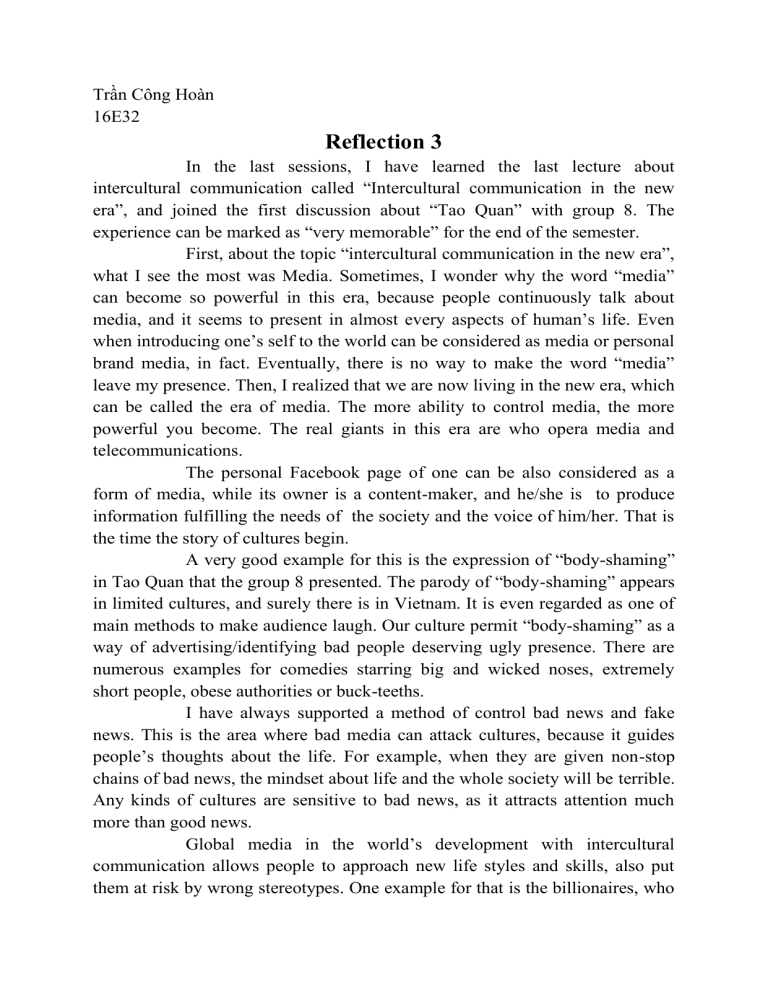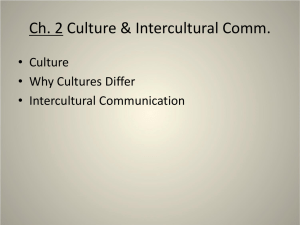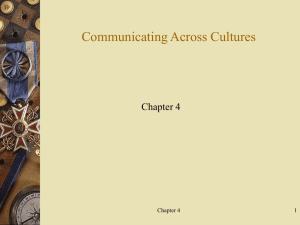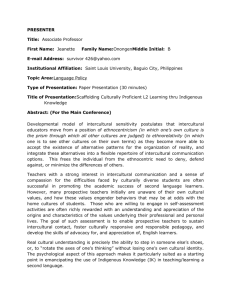Intercultural Communication Third Reflection

Trần Công Hoàn
16E32
Reflection 3
In the last sessions, I have learned the last lecture about intercultural communication called “Intercultural communication in the new era”, and joined the first discussion about “Tao Quan” with group 8. The experience can be marked as “very memorable” for the end of the semester.
First, about the topic “intercultural communication in the new era”, what I see the most was Media. Sometimes, I wonder why the word “media” can become so powerful in this era, because people continuously talk about media, and it seems to present in almost every aspects of human’s life. Even when introducing one’s self to the world can be considered as media or personal brand media, in fact. Eventually, there is no way to make the word “media” leave my presence. Then, I realized that we are now living in the new era, which can be called the era of media. The more ability to control media, the more powerful you become. The real giants in this era are who opera media and telecommunications.
The personal Facebook page of one can be also considered as a form of media, while its owner is a content-maker, and he/she is to produce information fulfilling the needs of the society and the voice of him/her. That is the time the story of cultures begin.
A very good example for this is the expression of “body-shaming” in Tao Quan that the group 8 presented. The parody of “body-shaming” appears in limited cultures, and surely there is in Vietnam. It is even regarded as one of main methods to make audience laugh. Our culture permit “body-shaming” as a way of advertising/identifying bad people deserving ugly presence. There are numerous examples for comedies starring big and wicked noses, extremely short people, obese authorities or buck-teeths.
I have always supported a method of control bad news and fake news. This is the area where bad media can attack cultures, because it guides people’s thoughts about the life. For example, when they are given non-stop chains of bad news, the mindset about life and the whole society will be terrible.
Any kinds of cultures are sensitive to bad news, as it attracts attention much more than good news.
Global media in the world’s development with intercultural communication allows people to approach new life styles and skills, also put them at risk by wrong stereotypes. One example for that is the billionaires, who
left schools and refused to academic trainings, tends to achieve great success.
Actually, the knowledge is totally wrong, but it remains in many people as a belief about that schools are bad.
Dr. Nguyen Phuong Mai, who is teaching in Holland, stated that half of the students in her university fails all the courses in their first semester, and about 40% of which will drop out. Then, more and more students fail in the next semesters, and that is understandable. In their culture, fails at school seem to be ordinary, more than passing all courses, which can be wrongly referred into Vietnamese culture as the education is too bad. In fact, those students are just not qualified enough.
Next week, I am doing a talk show presenting interesting knowledge about a brand-new topic, the cross-cultural communication in between Vietnamese and Korean. I think it will be really helpful for this time, when more and more Vietnamese students choose to learn this language, and
Korean itself is preserving some interesting ideas about hierarchy, resulting from the ancient times of their history.
I will not focus too much on details, then my team and I are concentrating on the differences and similarities, especially the main question that we are coming to solve at the end of the session. All of the information is describe as shortly as possible in order to reveal our group’s ideas and discussion about the topic.


